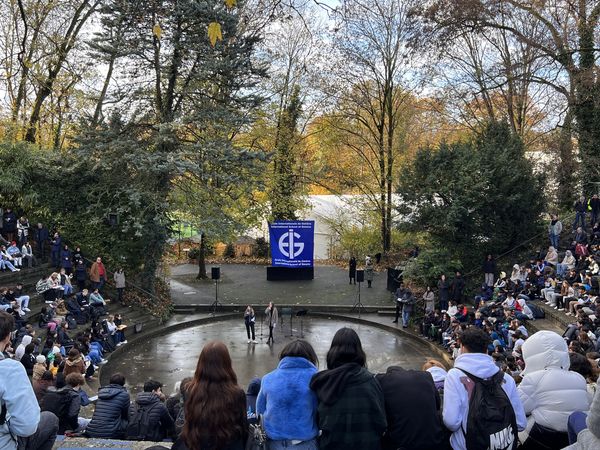By Sabine Ebanks, Year 13
When war broke out in Ukraine this February after the Russian invasion, Ecolint’s international population was affected in varying ways. There was widespread uproar at the violation of international norms and the atrocities being committed against civilians in Ukraine. Many students with origins that were on different sides of the conflict held strong opinions on the sensitive topic. There was also substantial controversy over whether the administration should weigh in on the issue, with significant criticism from both sides. The LGB Express initially interviewed Dr. Hughes shortly after the invasion, where he shared his thoughts on the position of an international school in relation to global conflicts. Now, nearly nine months later, The Express has interviewed him again on how the school’s response has evolved and what has been done to help those affected by the war.
Some responses have been edited for clarity.
The Express last interviewed you on the war in Ukraine in late March. How has the school’s response evolved since then?
We opened extra curricular activities for free to our families hosting refugees from Ukraine and other parts of the world, 100 Summer Camp places were given to refugee children at the Hospice Générale including many Ukrainian children. Note that these gestures were open to other refugees too, as we want to include in what we do those who suffer from war regardless of nationality, creed or cultural affiliation.
Has the school welcomed Ukrainian students? What special support have they received?
Yes, we had a student receive free tuition here in order to gain credit to present a high school diploma to universities. The request came from a Russian family hosting the child. That’s Ecolint’s spirit: working together across national boundaries for a better world. With, at the centre, the student.
Have the initiatives to support those affected been primarily led by students or parents? Or is the administration involved?
All three: the administration coordinated the opening of free places at Ecolint and educational offerings for victims of the conflict; students were involved in various fund-raising initiatives, as was the PTA, notably coordinating a successful clothing drive.
How are students of different age groups being educated on the conflict, if at all, in the classroom setting?
That’s a good question. We held two assemblies on the matter, including one led by Mr. Hamzavi. He described, carefully and conscientiously, the historical dimensions of the conflict including various treatises leading up to the invasion; the role of NATO in the situation and the complex, intertwined historical roots of Ukraine and Russia’s relationship. He went on to give this same lecture to students at Campus des Nations.
Deep understanding is fundamental especially in an age of social media, so I’d like to thank Mr. Hamzavi for the sound historical overview he gave us.
I know that follow-up discussions were held in class, especially in history. I shared with all schools in the Foundation some of the key dates in Ukraine’s history, going all the way back to Oleg of Novgorod, through to the Soviet period and more recent elections. Mr. Hamzavi and other history teachers helped create this pedagogic resource for teachers in the foundation.
There was a lot of talk at the beginning of the war about how we need to wait to condemn any events in Ukraine until they’re over and fully investigated. But now, with more clarity on situations like that in Mariupol (where there are credible accusations from international experts of war crimes and genocide), do you think it would be appropriate to condemn certain actions by either party in the war?
Yes, we condemn all actions of violence, illegal invasions and transgressions of international law. This goes back to our origins as the League [of Nations] School, inextricably linked to the values of the United Nations: the desire for a more peaceful world where national sovereignty is respected and work for a sustainable future is accomplished through partnerships. As an international school dedicated to peace, we condemn war. The stories coming out of the situation in Ukraine are tragic and we can only say no to this, hoping that the violence will come to an end and people’s lives can resume to normal.
How do you see the school’s response to this ongoing crisis evolving, if at all, in the future?
I see us standing firmly by our values, enshrined in Article 4 of our charter. Human life is sacred and war is a terrible thing. We stand by the victims of war throughout history, working – in our fashion – towards a more peaceful world.
Is there anything else you would like to add about the school’s ongoing response to the crisis?
Some people think that the right thing for a school to to do is to publicly condemn nation states, foreign policy decisions and political leaders. I disagree: it is the ideas that we are combatting, not the people. Ecolint does not condemn countries or citizens of those countries, we condemn all forms of violence (symbolic and structural) and continue to model peaceful collaboration across boundaries.
It is heartbreaking to see the suffering in Ukraine, Iran, Afghanistan, Yemen and many other parts of the world, not to mention the losses due to environmental disasters (flooding in Pakistan, and more). Through our various assemblies, lessons and learning opportunities, we must remain united as a group of people from all over the world, sometimes representing the very countries that are at war with one another.




What a powerful article. I strongly agree with the quote “it is the ideas that we are combatting, not the people”. Pointing fingers and calling names does not do anything. What matters is the harmful ideas which intoxicate all corners of society. Love and peace!